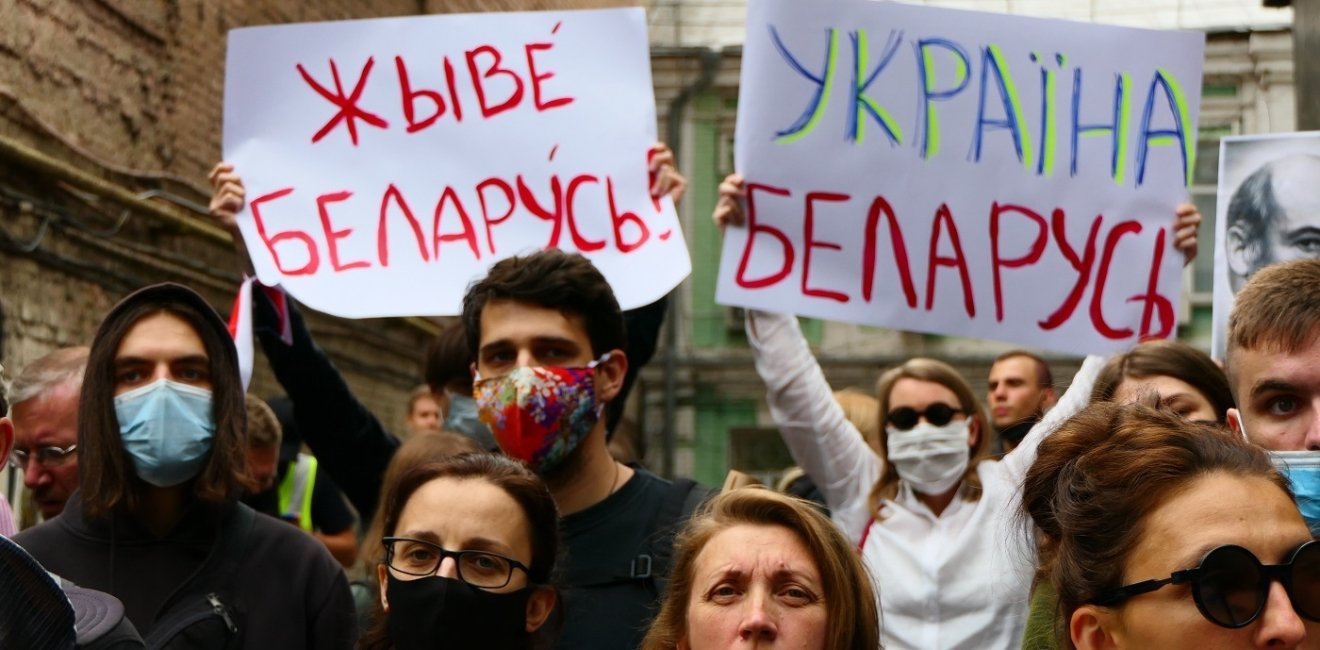
A blog of the Kennan Institute
In February 2022 the Russian Federation embarked on a full-scale invasion of Ukraine that included attacks launched from the territory of Belarus. This led to severe deterioration in Ukraine-Belarus relations in economic, political, and security domains. Despite perceiving the Minsk regime as threatening, Kyiv today maintains a very limited dialogue on practical issues while hewing to a somewhat cautious stance on cooperation with the Belarusian democratic forces. Such a restrained approach is motivated both by Ukraine’s security concerns and by Kyiv’s lack of a strategic vision regarding Belarus.
The Erosion of Economic Cooperation
Before 2022, Ukraine's foreign policy strategy toward Belarus initially aimed at leveraging trade to prevent Russian encroachment on Belarusian sovereignty. When the EU imposed sectoral sanctions on Belarus in mid-2021, Ukraine not only became the main market for Belarusian petroleum products and electricity exports but also presented a possible way for Belarus to circumvent sanctions through trade.
Once Belarus became a bridgehead for Russia’s large-scale invasion, however, Ukraine changed course and divested from strategically important Belarusian imports, particularly petroleum products. The Lukashenko regime’s involvement in Russia’s aggression made it impossible for Kyiv to maintain trade relations at the same level with official Minsk. Consequently, bilateral trade plummeted from a peak of $6.9 billion in 2021 to $1.6 billion in 2022, marking a severe decline. Data from 2023 show that bilateral trade dwindled further, to just $13.8 million, in the first seven months of that year, highlighting the collapse of economic cooperation.
Political Relations at a Standstill
Since February 2022, Ukraine-Belarus political relations have degraded to their lowest point in history, characterized by minimal communication and significant diplomatic withdrawals. Both states de jure preserve diplomatic relations, but practical engagement has been severely curtailed. Ukrainian and Belarusian ambassadors have been recalled, with Ukraine reducing its embassy staff in Minsk to just five and Belarus evacuating its diplomats from Ukraine.
Ukraine still preserves diplomatic relations with Belarus for three reasons. First, Moscow and Kyiv use the channel in Minsk to exchange notes and transmit legal and consular documents. Second, Belarus is one of the few routes by which Ukrainians from the occupied territories can reach territories controlled by the Ukrainian government. And third, the presence of Ukrainian diplomats on Belarusian soil is a signal to Minsk that official Kyiv will not resort to military force against Belarus.
In light of the lack of trust and formal diplomatic engagement at the highest level, communication is mostly conducted through intelligence services or other closed channels. The goal on Kyiv’s part is to influence the Belarusian political leadership and mitigate the security threats posed by the regime.
Evolution of the Lukashenko Regime’s Role in the War
Since mid-2022, the Minsk regime’s direct threats against Ukraine have diminished, largely because of the reduced Russian military presence in Belarus compared to the buildup preceding the full-scale invasion of Ukraine. Currently, approximately 2,000 Russian soldiers remain on Belarusian territory, primarily tasked with maintaining Russian aviation and radio technical equipment.
However, Belarus's role in the Russo-Ukrainian conflict has evolved significantly. Initially serving as a base for Russian military operations, Belarus has transitioned into a crucial supplier of military hardware, munitions, and military components to Russia.
Belarus has also become a participant in Russia’s psychological and informational operations that precede any new phase in the Russo-Ukrainian War. For instance, leaked Pentagon documents revealed Russian efforts in the first half of 2023 to create the impression among Ukrainian intelligence of a potential second offensive originating from Belarus.
Similar processes of a bellicose nature are now taking place in association with the Russian offensive in eastern Ukraine. The Lukashenko regime is conducting military drills and accusing the Kyiv authorities of deploying saboteurs on its territory. These factors, coupled with mobilization, training, and statements about preparations for war, likely are intended to put pressure on Ukrainian society and military-political leadership.
Low Chances of Serious Escalation
Nonetheless, the prospects for a renewal of missile or drone attacks or a repeat offensive launched from Belarusian territory are fairly low. Turning Belarus into a war zone would be disadvantageous both for Lukashenko, who, like any autocrat is primarily guided by a keen interest in preserving his regime, and for Russia, because its ability to obtain necessary components and petroleum products from Belarus would be undermined by Ukraine’s attacks on defense facilities and refineries located on Belarusian soil.
Moreover, Ukraine is not only better prepared for possible escalation but also has at its disposal Belarusian volunteer units, particularly the Kalinousky Regiment. The Minsk regime views these volunteers as a potential threat and a source of destabilization inside the country. For this reason, the Ministry of Internal Affairs of Belarus has created several antiterrorist units, while the Belarusian KGB has designated the volunteers as extremists and started criminal proceedings against members of their families.
Restrained Position with Respect to Belarusian Democratic Forces
While Belarusian volunteers are seen as integral to a military-political strategy aimed at deterring the Lukashenko regime, Kyiv is somewhat cautious about cooperating with the Belarusian activist and leader of the political opposition Sviatlana Tsikhanouskaya and her team. Security remains Kyiv's top priority, and Ukrainian authorities avoid provoking Lukashenko or disrupting fragile relations with official Minsk by engaging more deeply with Belarusian democratic forces, whom they perceive as having limited ability to deter the Minsk regime or significantly aid Ukraine's war efforts.
Despite these challenges, ongoing communication between Ukrainian parliamentarians and representatives of the United Transitional Cabinet of Belarus, the government in exile, as well as Kyiv’s appointment of an ambassador-at-large for Belarus tasked with engaging democratic forces, may create opportunities for closer relations between Kyiv and the Belarusian democratic movement in the future and help Kyiv deal with the leadership in Minsk.
Kyiv Must Reevaluate Its Current Approach to Belarus
Ukraine has been successful in deterring the Lukashenko regime; however, such a limited approach does not eliminate threats and ensure longlasting security and stability on Ukraine’s northern border. Ukraine must adopt a more proactive and thoughtful policy with regard to Belarus that includes a broad range of tools. Doing so would increase Kyiv’s agility in mitigating negative impacts and help it leverage new opportunities for supporting the Belarusian democratic movement and deal with the leadership in Minsk.
The opinions expressed in this article are those solely of the author and do not reflect the views of the Kennan Institute
Author


Kennan Institute
The Kennan Institute is the premier US center for advanced research on Eurasia and the oldest and largest regional program at the Woodrow Wilson International Center for Scholars. The Kennan Institute is committed to improving American understanding of Russia, Ukraine, Central Asia, the South Caucasus, and the surrounding region through research and exchange. Read more

Explore More in Focus Ukraine
Browse Focus Ukraine
Talking to the Dead to Heal the Living

Ukrainian Issue in Polish Elections


